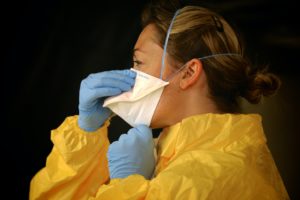Can PPE Really Help Prevent COVID Cases at Work?
Since the COVID-19 pandemic first began, there has been over a 1,000% increase in the amount of money workplaces spend on personal protective equipment (PPE). The right PPE can both prevent employees from getting sick and help keep customers safe. Therefore it is essential for businesses to make sure their employees have proper protective gear.Types of PPE and How They Prevent COVID-19 Spread
PPE comes in all sorts of different styles and designs. Not every business will have the same PPE needs. Instead, companies should take into account the level of risk that their employers and customers will face. The most intensive types of PPE are devices that cover the full body and filter almost all air. A respirator, which is often called an N95 mask, is a type of tight-fitting mask that filters out at least 95% of all airborne molecules. This is essential personal protective equipment for anyone working with COVID patients or working in places where patients are most likely present. With mask shortages still ongoing, respirators are primarily being saved for health care workers. A slightly less safe alternative to respirators is a face mask. Made out of cloth, paper, plastic or other filtering materials, face masks provide a decent amount of protection from COVID-19 infection. They are recommended for anyone who will be in contact with others. Therefore, a mask is helpful for office workers, retail workers and more. In states like Pennsylvania, masks are legally required anytime a person is outside the home. Face masks work by making it difficult for large airborne droplet particles to spread COVID when a person speaks, coughs or breathes. They are extremely effective. A study published in Health Affairs found mask mandates reduced COVID spread, while another study linked lower COVID death rates to higher mask-wearing rates. COVID mostly spreads by breathing in the virus, but there is some concern about infected particles spreading through the mouth and eyes. Therefore, some businesses may benefit from face masks or goggles that protect the eyes. Face shields alone cannot replace masks since they do not seal tightly around the nose. However, they can be helpful in conjunction with other PPE. Gloves can further reduce coronavirus spread by protecting the hands from COVID-19 particles. However, to be effective, gloves must be changed regularly and removed before eating or touching the face. Otherwise, they can hold onto and spread COVID particles just like bare skin. The final category of PPE that businesses may need to employ is protective gowns or coveralls. Like respirators, this protective gear is not considered necessary for most types of jobs. However, for businesses directly interacting with COVID-19 patients, it is essential. Protective clothing reduces the risk of airborne particles clinging to clothing and being spread around by employees. To work well, it needs to be carefully removed after interacting with COVID-10 patients.Is Providing PPE a Business' Responsibility?
OSHA has already weighed in on the necessity of PPE during COVID-19. According to its statement, employers are required to create policies that provide a safe work environment. A workplace has a duty of care to follow both industry standards and regulatory guidance. During the pandemic, this means following all state and local mandates for PPE wear in work. Even if there are no specific legal requirements in place, OSHA recommends that any employees who interact with the public or other coworkers wear PPE. This includes:- Retail workers
- Office staff
- Hospitality workers
- Delivery staff
- Health care professionals
- Government officials
- Other public business employees
 The only time a workplace is not responsible for ensuring that workers wear PPE is if the workers have minimal contact with the public or coworkers. For example, a teleworking company does not need to go out of their way to ensure phone operators have PPE.
Companies are not technically required to provide the PPE, but they do have to ensure that employees are wearing it. This may mean sending workers home or requiring them to work in a non-customer facing role if they do not have a face mask or other protection. To keep a lack of PPE from getting in the way of work, employers may therefore want to provide a stock of PPE for employees to use. Furthermore, it is a good idea for workplaces to have a set of guidelines on how to use PPE. This can include company-wide workshops or emails to explain PPE usage and defined PPE-donning stations in break rooms and employee lockers.
The only time a workplace is not responsible for ensuring that workers wear PPE is if the workers have minimal contact with the public or coworkers. For example, a teleworking company does not need to go out of their way to ensure phone operators have PPE.
Companies are not technically required to provide the PPE, but they do have to ensure that employees are wearing it. This may mean sending workers home or requiring them to work in a non-customer facing role if they do not have a face mask or other protection. To keep a lack of PPE from getting in the way of work, employers may therefore want to provide a stock of PPE for employees to use. Furthermore, it is a good idea for workplaces to have a set of guidelines on how to use PPE. This can include company-wide workshops or emails to explain PPE usage and defined PPE-donning stations in break rooms and employee lockers.



Speak Your Mind